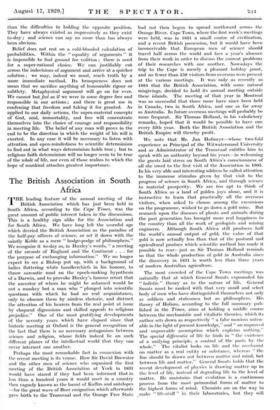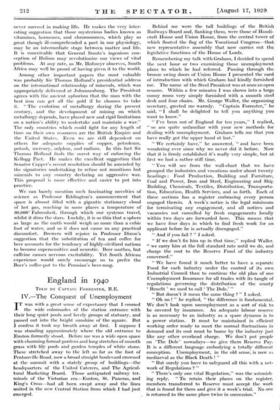The British Association in South Africa
THE leading feature of the annual meeting of the British Association which has just been held in South Africa, according to the Cape Times, was the great amount of public interest taken in the discussions. This is a healthy sign alike for the Association and for South Africa. We have long left the scornful age which decried the British Association as the paradise of the half-pay officers of science, or set it down with the saintly Keble as a mere " hodge-podge of philosophers." We recognize it to-day as, in Huxley's words, " a meeting of the savants of England and the Continent . . . for the purpose of exchanging information." We no longer expect to see a Bishop put up, with a background of ladies fluttering white handkerchiefs in his honour, to throw sarcastic mud on the epoch-making hypothesis of a Darwin, and to provoke Huxley's famous retort that the ancestor of whom he might be ashamed would be not a monkey but a man who " plunged into scientific questions with which he had no real acquaintance, only to obscure them by aimless rhetoric, and distract the attention of his hearers from the real point at issue by eloquent digressions and skilled appeals to religious prejudice." One of the most gratifying developments of the seventy years which have elapsed since that historic meeting at Oxford is the general recognition of the fact that there is no necessary antagonism between science and religion, whose fields indeed lie on such different planes of the intellectual world that they can never intersect one another.
Perhaps the most remarkable fact in connexion with the recent meeting is its venue. How Sir David Brewster and the other men of science who organized the first meeting of the British Association at York in 1881 would have stared if they had been informed that in less than a hundred years it would meet in a country then vaguely known as the haunt of Kaffirs and antelopes —for the great wave of Boer emigration which afterwards gave birth to the Transvaal and the Orange Free State had not then begun to spread northward across the Orange River. Cape Town, where the first week's meetings were held, was in 1881 a small centre of civilization, and a recent British possession, but it would have been inconceivable that European men of science should travel half across the world and face a year's absence from their work in order to discuss the current problems of their researches with one another. Nowadays the trip to the Cape is merely a pleasant holiday jaunt, and no fewer than 550 visitors from overseas were present at the various meetings. It was only as recently as 1884 that the British Association, with some natural misgivings, decided to hold its annual meeting outside these islands. The meeting of that year in Montreal was so successful that three more have since been held in Canada, two in South Africa, and one as far away as Australia. In future overseas meetings will probably be more frequent. Sir Thomas Holland, in his valedictory remarks, hoped that it would be possible to have one every fifth year. Both the British Association and the British Empire will thereby profit.
We note that Mr. Jan Hofmeyr—whose two-fold experience as Principal of the Witwatersrand University and as Administrator of the Transvaal entitles him to: speak with an authority beyond his years—in welcoming the guests laid stress on South Africa's consciousness of all she owed to the first visit of the Association in 1905. In his very able and interesting address lie called attention to the immense stimulus given by that visit to the progress of science in South Africa, and through science to material prosperity. We are too apt to think of South Africa as a land of golden joys alone, and it is instructive to learn that practically all the overseas visitors, when asked to choose among the excursions on the programme, wished to go down a gold mine. But research upon the diseases of plants and animals during the past generation has brought more real happiness to the country than all the work of geologists and mining engineers. Although South Africa still produces half the world's annual output of gold, the value of that gold is now actually less than that of the pastoral and agricultural produce which scientific method has made it possible to rear—just as Sir Thomas Holland reminds us that the whole production of gold in Australia since the discovery in 1851 is worth less than three years of modern Australian agriculture.
The most crowded of the Cape Town meetings was naturally that at which General Smuts expounded his " holistic " theory as to the nature of life. General Smuts must be ranked with that very small and select body of men who have distinguished themselves not only as soldiers. and statesmen but as philosophers. His theory of Holism, according to the full summary pub- lished in the Times, aims at holding a middle course between the mechanistic and vitalistic theories, which its author sets down as respectively " a false monism unten- able in the light of present knowledge," and " an unproved and unprovable assumption which explains nothing." The special differentia of life lie finds in " the existence of a unifying principle, a control of the parts by the whole." The vitalist looks on life and the mechanist on matter as a real entity or substance, whereas " the line should be drawn not between matter and mind, but between life and matter." General Smuts holds that the recent development of physics is drawing matter up to the level of life, instead of degrading life to the level of matter. He maintains that evolution is a continuous process from the most primordial forms of matter to the highest forms of mind. Chemists are on the way to .make " life-stuff " in their laboratories, but they will never succeed in making life. He makes the very inter- esting suggestion that those mysterious bodies known as vitamines, hormones, and chromosomes, which play so great though ill-comprehended a part in our physiology, may be an intermediate stage between matter and life. It is conceivable that General Smuts's ingenious con- ception of Holism may revolutionize our views of vital problems. At any rate, as Mr. Hofineyr observes, South Africa may well be proud of having given it.to the world.
Among other important papers the most valuable was probably Sir Thomas Holland's presidential address on the international relationship of minerals, which was appropriately delivered at Johannesburg. The President agrees with the ancient aphorism that the man with the best iron can get all the gold if he chooses to take it. " The evolution of metallurgy during the present century, and the development of mining on which metallurgy depends, have placed new and rigid limitations on a nation's ability to undertake and maintain a war." The only countries which could fight for any length of time on their own resources are the British Empire and the United States. Even we are still dependent on others for adequate supplies of copper, petroleum, potash, mercury, sulphur, and radium. In this fact Sir Thomas Holland finds the surest way of enforcing the Kellogg Pact. He makes the excellent suggestion that Senator Capper's recent resolution should be amended by the signatories undertaking to refuse not munitions but minerals to any country declaring an aggressive war. This proposal is more effective and easier to put into practice.
We can barely mention such fascinating novelties of science as Professor Eddington's announcement that space is almost filled with a gigantic stationary cloud of hot gas, reaching in some places a temperature of 30,000° Fahrenheit, through which our systems travel, whilst it dims the stars. Luckily, it is so thin that a sphere as large as the earth would weigh no more than a cubic foot of water, and so it does not cause us any. practical discomfort. Brewers will rejoice in Professor Dixon's suggestion that the substitution of tea and coffee for beer accounts for the tendency of highly-civilized nations to become supersensitive and neurotic. Beer soothes, but caffeine causes nervous excitability. Yet South African experience would surely encourage us to prefer the Boer's coffee-pot to the Prussian's beer-mug.

































 Previous page
Previous page